Covid-19 66
Trump and Covid-19

Trump, an Egomaniacal Monster, and Covid-19
WHO Director-General Tedros has been clear about attitudes like those of Trump and others: “Quarantine policy…”, at the WHO “no policy is made”, its mission is “to care for the poor and vulnerable”
By Juana Carrasco Martín
April 9, 2020
Translated and edited by Walter Lippmann for CubaNews.
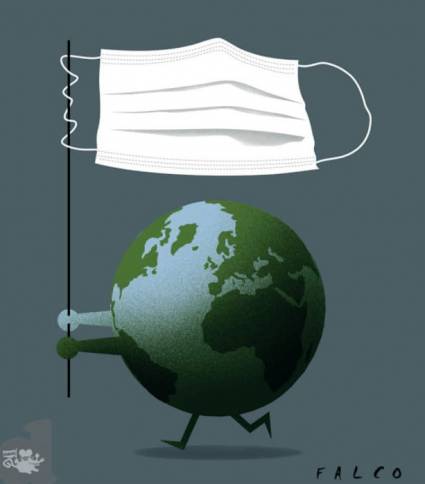
While Trump tries to discredit the World Health Organization, the world is still struggling Author: Falco Posted: 09/04/2020 | 04:32 pm
He’s definitely not crazy, he’s a shameless, cynical bastard. A criminal of the same ilk as Hitler. A being unworthy of belonging to the human species. Every day he does or says an atrocity or various monstrosities. Of course, I am referring to Donald Trump, the powerful president of the United States, which is why he tells us so much about what he says or does.
This Tuesday, April 7, when the world counted 78,269 deaths and at least 1,381,014 people infected with Covid-19, figures that continue to grow by the minute, Trump announced that he will suspend the U.S. contribution to the World Health Organization (WHO).
An hour before this mention at his daily press conference at the White House – not before he had given a rapid test of the virus to everyone in the vicinity of the president and vice president Mike Pence, especially reporters – Trump had exposed on his personal Twitter account that the World Health Organization (WHO) was too focused on China and had given – in his opinion – wrong advice during the outbreak of the new coronavirus.
The campaign to discredit the World Health Organization coincides with a revelation by the WHO’s director-general, Ethiopian microbiologist Tedros Adhanom Ghebreyesus, who said that in the past three months, during which his organization has led the global fight against the coronavirus, it has received threats of death and attacks of various kinds, including racist ones.
“I’ve been getting personal attacks for three months, some of them racist, and to be honest I’m proud of my color. I have even received death threats, but I don’t care at all. Why would I care about being attacked if people are dying, we are losing lives every minute,” he said.
“When it’s personal I don’t care, I’m no better than anyone else, but when an entire community is insulted, then that’s it, I can’t tolerate that,” he said in a calm tone.
Tedros has been clear about attitudes like those of Trump and others: “Quarantine politics…”, at the WHO “you don’t make politics”, its mission is “to care for the poor and vulnerable” in these times when the whole world is embroiled in the crisis caused by the coronavirus.
This was the motivation of the American president, when the Director of the WHO rejected the racism of “scientists” who propose to use Africa as a laboratory for criminal experiments on the population. This would have been under the pretext of looking for a Covid-19 vaccine, Trump decided to punish the WHO. Venezuelan diplomat Samuel Moncada, commented on Twitter: “It is colonialism at war with the world”.
But Trump’s actions are not limited to looking to the WHO as a scapegoat for his own mistakes in handling the crisis, which he long ignored, but he had even denied the terrible importance of the disease.
If we are particularly affected and hurt by the application of the laws of the blockade to prevent a Chinese donation to Cuba from reaching the Greater Antilles, it must be pointed out that it acted with equal dishonesty and lack of ethics towards its allies. For example, Canadian Prime Minister Justin Trudeau has pointed out that he is still working to persuade Washington to lift the blockade on a shipment of half a million masks that should have arrived in Ontario on Wednesday.
The lord of the White House does not lose his ways, and when the world needs love, courage, compassion, generosity and commitment to the truth of what is happening, Donald Trump continues to set deadly traps.
Neighborhood Heroines

photo reporting
Neighborhood Heroines (+ videos)
The woman, as always, where they are most needed. The work is enriched by the fruit of her labor
Author: Juvenal Balán Neyra : juvenal@granma.cu
April 6, 2020 18:04:25
Translated and edited by Walter Lippmann for CubaNews.
In the Naroca neighborhood, Boyeros municipality, the dynamics of the current moments of confrontation with the COVID-19, has changed the coming and going of neighbors, the children’s games in the surroundings of the buildings, although some essential services for the population remain vital.
In the apartments the sewing machines are kept in constant movement. Women of all ages spend much of their precious time in front of them. The legs are exercised with the pedal. The eyes are fixed on the passage of the fabric, through the needle, which at a dizzying pace is shaping the nasobuco. Others tidy up and finish them off. In short, there is motivation to create and contribute. It’s time to do.
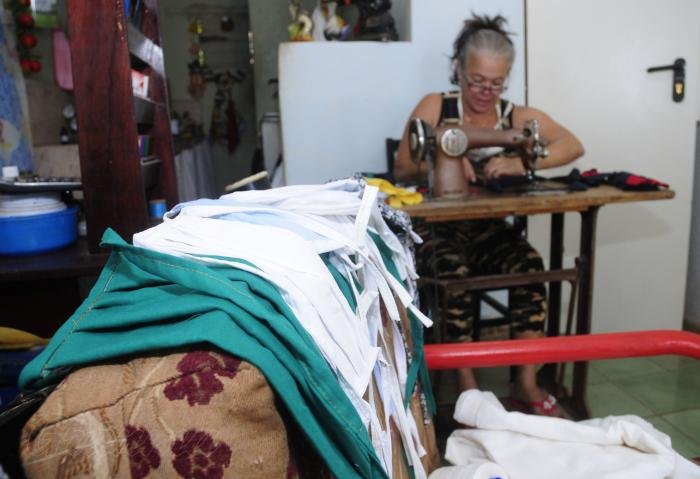
Photos and videos here:
http://www.granma.cu/fotorreportajes/2020-04-06/heroinas-del-barrio-06-04-2020-18-04-25
Coronavirus and Cuba: A Devastating Impact
- English
- Español
Coronavirus and Cuba: A Devastating Impact
 By Domingo Amuchastegui, received on April 8, 2020
By Domingo Amuchastegui, received on April 8, 2020
A CubaNews translation. Edited by Walter Lippmann.
The rapid spread of this virus almost everywhere in the world poses very serious and complex challenges that go beyond the frameworks of a worrying pandemic to transcend the social-economic sphere in a thousand different ways. The virus has reached Cuba -on a very limited scale- and this forces us to assess what could be devastating consequences for a poor country, clinging to a system that has proven to be inoperative and a particularly harmful economic war on the part of the Trump administration. Examining such effects is what we are trying to do as a first approximation.
Tourism industry: Being the first source of income for the country, it is facing an immediate collapse or paralysis for a prolonged period, thus becoming a sort of Achilles’ heel for the current economic situation of the Island. A virtual chain reaction ensues with massive cancellations of visitors from abroad (Canada, Europe and the United States), a drastic – if not total – reduction in the movement of airlines and cruise ships from Europe, chaos in imports and logistics of this industry and the suspension of the important branch of international events that has distinguished Havana so much in previous years. In this sense, the postponement of the “The Nation and Emigration,” conference, which was scheduled for the beginning of April, has already been announced. It is very likely that a similar destination will host the International Tourism Fair -which is held every year- and other international events planned to take place in Havana .
Emigration: Cuban emigrants in the US and other countries (mainly Mexico and Spain) will be mostly inclined to cancel their trips to Cuba until the current situation is overcome, with the consequent reduction of income by this route for Cuba. As a result of the tensions within the US itself, remittances could also suffer significant reductions. This perspective will be aggravated if the initiative launched by the authorities in Miami and supported by the governor of Florida to put an end to all flights to and from Cuba is approved.
Foreign Trade: Cuba’s foreign trade will tend to suffer various consequences in relation to its imports and exports, taking into account that its main trading partners are China and the European Union (EU). In particular, imports essential to key industries and services (sugar, biopharmaceuticals, medical missions and others) may suffer a severe contraction. The reorientation of imports towards those more connected to health will inevitably lead to significant reductions in other areas.
Oil. Someone could say that the sharp fall in prices could benefit Cuba. Nothing could be further from the truth. The reason is quite simple: the two countries that owe Cuba the most for their medical services and others like Venezuela and Angola will have to postpone payments -as happened with the fall in prices years ago- thus adding another important effect on income. Venezuela may or may not compensate its debts to Cuba through additional oil shipments, but it will have to be seen whether this happens or not; if it does, Caracas would provide an important mitigating element. The same is true in the case of Angola. As for Russia and its multi-million dollar projects in Cuba -including oil prospecting and sales- we will have to see how this will be conducted, with very little optimism taking into account the numerous negative precedents of the last decades in the sphere of bilateral relations.
Economic Plan: This year’s Economic Plan is suffering serious disruptions as a result of the high reduction in hard currency income and the urgent reorientation of priorities towards the area of health and trying to ensure survival at markedly low levels. The impact on Cuba’s commitments with regard to the recent deferral of its foreign debt payments, and the guarantee that these would be made soon, will be no less disrupted and deferred.
Cuba will undoubtedly experience a unique crisis situation that will not be short-lived but rather a long and very complex one. From now on, it will face a very complex agenda of new challenges and priorities.
CORONAVIRUS Y CUBA: UN IMPACTO DEVASTADOR
 Por Domingo Amuchastegui, Recibido el 8 de abril de 2020
Por Domingo Amuchastegui, Recibido el 8 de abril de 2020
La rápida propagación de este virus por casi todo el mundo plantea muy serios y complejos retos que desbordan los marcos de una preocupante pandemia para trascender al ámbito económico-social de mil maneras diferentes. El virus ha llegado a Cuba -en una muy limitada escala todavía- y esto obliga a valorar lo que pudieran ser consecuencias devastadoras para un país pobre, aferrado a un sistema probadamente inoperante y una guerra económica particularmente perjudicial de parte de la administración Trump. Examinar semejantes efectos es lo que intentamos hacer a manera de una primera aproximación.
Industria turística: Siendo ésta la primera fuente de ingresos del país, se enfrenta a un inmediato colapso o parálisis por un prolongado período, convirtiéndose así en una suerte de Talón de Aquiles para la actual situación económica de la Isla. Una virtual reacción en cadena sobreviene con las cancelaciones masivas de visitants del exterior (Canadá, Europa y EEUU), de una reducción drástica -si no total- del movimiento de las aerolíneas y cruceros provenientes de Europa, caos en las importaciones y logítica de esta industria y la suspensión de la importante rama de de eventos internacionales que tanto ha distinguido a La Habana en años anteriores. En este sentido ya se anunció la posposición de la conferencia “La Nación y la Emigración,” que estaba prevista para comienzos de abril. Muy probable que un destino similar correrá la Feria Internacional de Turismo -que se celebra cada año- y otras actividades internacionales previstas para celebrarse en La Habana..
Emigración: Los emigrados cubanos en EEUU y otros países (principalmente México y España) se inclinarán mayoritariamente hacia la cancelación de sus viajes a Cuba hasta que no se supere la actual coyuntura, con la consiguiente reducción de ingresos por esta vía para Cuba. Producto de las tensiones dentro de los propios EEUU, las remesas podrán igualemente sufrir reducciones sensibles. Esta perspectiva se agrava si se aprueba la iniciativa lanzada por las autoridades de Miami y con respaldo del gobernador de la Florida de poner fin a todos los vuelos hacia y desde Cuba.
Comercio Exterior: El comercio exterior de Cuba tenderá a sufrir diversas consecuencias en relación a sus importaciones y exportaciones, tomando en cuenta que sus principales socios comerciales son China y la Unión Europea (UE). En particular, importaciones esenciales para industrias y servicios claves (azúcar, biofarmacéuticos, misiones médicas y otros) podrán sufrir una severa contracción. La reorientación de las importaciones hacia aquellas más conectadas a la salud, supondrán, inevitablemte, reducciones sensibles en otras esferas.
Petróleo. Alguien podrá decir que la brusca caída de los precios podrá beneficiar a Cuba. Nada más lejos de la realidad. La razón es bien sencilla: los dos países que más adeudan a Cuba por sus servicios médicos y otros como Venezuela y Angola, habrán de posponer pagos -como ocurrió con la caída de los precios años atrás- añadiéndose así otra importante afectación en materia de ingresos. Venezuela podrá o no compensar sus deudas con Cuba mediante envíos adicionales de petróleo, pero esto habrá que ver si se produce o no; de hacerlo, Caracas aportaría un importante element mitigante. Otro tanto es válido en el caso de Angola. En cuanto a Rusia y sus proyectos multimillonarios en Cuba -incluyendo la prospección y venta de petróleo- habrá que ver cómo se conducirá esto, con muy poco optimismo tomando en cuenta los numerosos precedentes de signo negativo de las últimas décadas en la esfera de las relaciones bilaterales.
Plan Económico: El Plan Económico del año en curso sufre graves trastornos como consecuencia de la elevada reducción de ingresos en moneda fuerte y la imperiosa reorientación de las prioridades hacia la esfera de la salud y de intentar garantizar la sobrevivencia a niveles marcadamente bajos. Las repercusiones sobre los compromisos de Cuba con respecto al reciente aplazamiento de sus pagos en materia de deuda externa y la garantía de que los mismos se producirían próximamente, sufrirán no menos trastornos y aplazamientos.
Sin dudas, Cuba atravesará una situación única de crisis que no abarcará un corto período de tiempo, sino una larga y complejísima coyuntura. En lo adelante, se enfrentará a una complejísima agenda de nuevos desafíos y prioridades.
Irresponsibility Puts Lives at Risk


Irresponsibility Puts Lives at Risk
It is necessary to close every gap where the new coronavirus enters, almost always accompanied by indolence, insensitivity and carelessness.
Author: Ortelio González Martínez | internet@granma.cuApril 8, 2020 23:04:55
Translated and edited by Walter Lippmann for CubaNews.
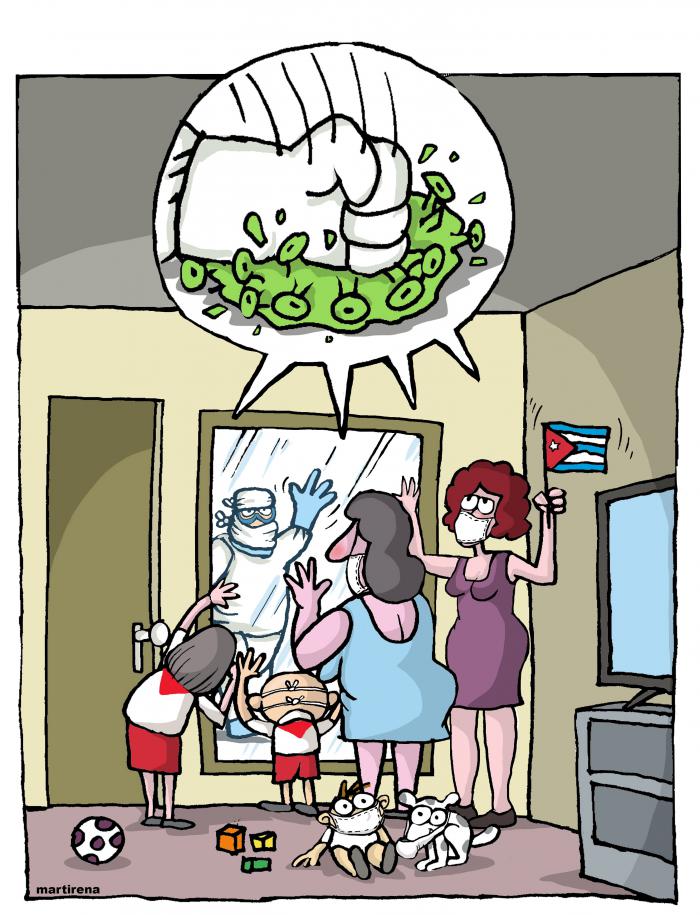
In a farewell celebration in Limpios Grandes, a community of a little more than 200 inhabitants belonging to the territory of Florencia, a traveler from the United States did not imagine that he would leave such a sad mark when, in the second half of March, he returned to his country of origin. There there were several people left infected with the new coronavirus, a figure that today reaches 17 patients, starting with case zero: a young woman who was only 18 years of age confirmed as positive on April 2.
The girl had close ties with the visitor and in turn with relatives in the community, which is why six of those confirmed live here, including some children. Another five confirmed cases are from the Florencia headwaters, allegedly infected at a family party she attended.
The value of the constructive criticism made by President Miguel Díaz-Canel Bermúdez at the meeting to follow up on the plan approved by the Cuban Government for the prevention and control of the new coronavirus on the island is based on the purpose of achieving a favorable change that will benefit each and every one of the people, whether or not they are involved in the current pandemic that is sweeping Cuba.
Without half-measures, he emphasized that “we still have to criticize those who are still reluctant to abide by the discipline necessary to keep the curve of the disease as flat as possible.
“This is not a request,” he said, “it is an obligation that we must assume with citizen responsibility and that must help us fulfill our institutions of internal order that are deployed, along with their people, in these difficult days.
“Life is telling us that, when someone hides information about their health status, we can mourn the loss of a life and we can mourn other lives that are put at risk.
In the face of the new coronavirus, there are no crossed arms in Ciego de Avila. Evaristo González Camacho, provincial director of the Integral Direction of Supervision, confirms figures: 3,727 inspections carried out, 1,862 fines imposed in the amount of 794,165 pesos; 813 warnings and 22 licenses to practice self-employment withdrawn (basically related to price violation).
The Provincial Prosecutor’s Office, for its part, had filed 20 cases as of 2 April, 11 of which were prosecuted as crimes of spreading epidemics, punishable under article 187 of the Criminal Code. These were generally persons who had violated the need for isolation, an extremely irresponsible behavior.
In addition, more than 327,000 investigations are carried out every day by medical and dental students, together with doctors, family nurses and political and mass organizations. “Now the important thing is to go deeper into the quality of the research,” Dr. Osvaldo Ivañez, provincial director of health, said at a press conference.
However, gaps exist. There is still a need to denounce in a timely manner the inappropriate conduct of the people, the people’s council and the on the block, because everything cannot be left to the forces of MININT.
It is necessary to act more rigorously in confronting the illegalities and behaviors that in the midst of the pandemic put people’s lives at risk; a call that the country’s highest leadership never tires of making.
Two people from Ciego de Avila died from sars-CoV-2, in the popular council of Florencia with a local transmission event, as well as the town of Turiguanó, 88 people in the isolation centers and figures with a tendency to grow in several municipalities. These, set off the alarms in the province, located among those with the most diagnosed cases (48) in the country.
It is necessary to close any gap where the new coronavirus enters, almost always accompanied by indolence, insensitivity and lack of concern.
Immunization, But Not Just Against the Virus

double click
Immunization, But Not Just Against the Virus
Let us hope that, once this pandemic is over, the Cuban people will end up being immunized, not only from the virus but also from that other scourge which is disinformation. In this way, we will be closing an important gap for this great historical enemy that is always looking for a way to inoculate its poison.
Author: Michel E. Torres Corona | internet@granma.cu
April 8, 2020 01:04:19
Translated and edited by Walter Lippmann for CubaNews.
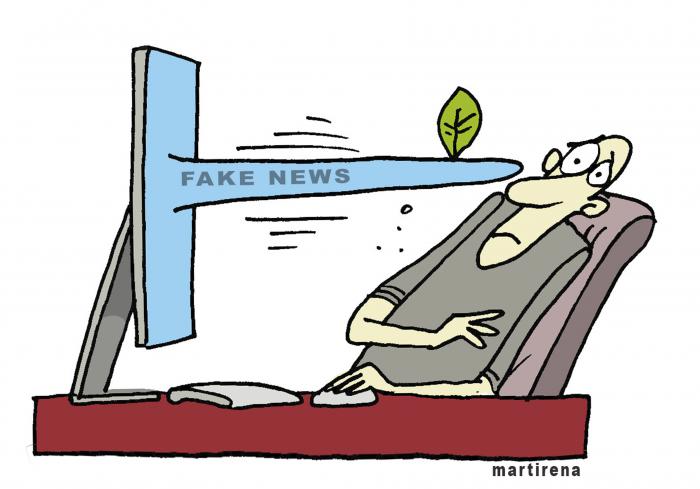
Photo: Martyr
“King, you know I’m a biologist.” That was the beginning of an audio that went viral on social networks, mainly on Whatsapp. Many people shared it, genuinely concerned about the questions that the supposed “biologist” was asking about Cuba’s strategy towards COVID-19.
Then it was Laura, “the one from Calixto”. If Rey’s biologist had previously felt the need to offer her academic credentials, now the new audio that was being circulated started from the very beginning clarifying a link with a public institution, in this case, the Calixto Garcia Hospital.
This new audio no longer questioned the Government’s strategy, but distorted facts and manipulated information to give the image that there was no real control over the confirmed cases and that the Cuban State was not acting with transparency.
“The virus is in the street,” said Laura (“the Calixto’s”), as she slipped in a few alarmist phrases, almost seeking to provoke panic and hysteria among her online “listeners.
But the icing on the cake was a third audio, which also went viral, and this time it was more like a science fiction suspense radio show. There was no longer any talk of the alleged shortcomings of the Cuban health system or of the “negligent” actions of the government.
No: now the story was that of outlaws, persecuted by the PNR, who were disguised as doctors. These alleged criminals would have entered national territory in a boat, deceived the population and instead of giving them medicinal drops, they would infect them with the sars-Cov 2.
All of the above would be humorous material if it weren’t for the fact that Cuba (and the rest of the planet) is facing a pandemic that has taken thousands of lives. But the Law foresees and sanctions this type of behavior.
Our Penal Code establishes a penalty of one to four years in prison for anyone who “spreads false news or malicious predictions tending to cause alarm or discontent in the population, or public disorder.”
Internet access and the use of mobile data, in addition to its obvious benefits, also places new users in an area where hoaxes (or fake news) abound. This vulnerability must be confronted with the timely dissemination of the truth in our media and the call of consciousness to only pay attention to truthful and contrasting information provided by legitimate sources.
In other words: pay more attention to Francisco Durán than to Laura “the one from Calixto”.
Let us hope that, once this pandemic is over, the Cuban people will end up being immunized, not only from the virus but also from that other scourge which is disinformation. In this way, we will be closing an important gap for this great historical enemy that is always looking for a way to inoculate its poison.
The Problem is Capitalism


The problem is Capitalism
Whoever believes that all other systems are worse, look at the blocked and vilified Island, where no one dies of hunger, everyone is guaranteed medical safety and the human being is the center of the system. The problem is capitalism.
By Ernesto Estévez Rams | internet@granma.cu
Translated and edited by Walter Lippmann for CubaNews.
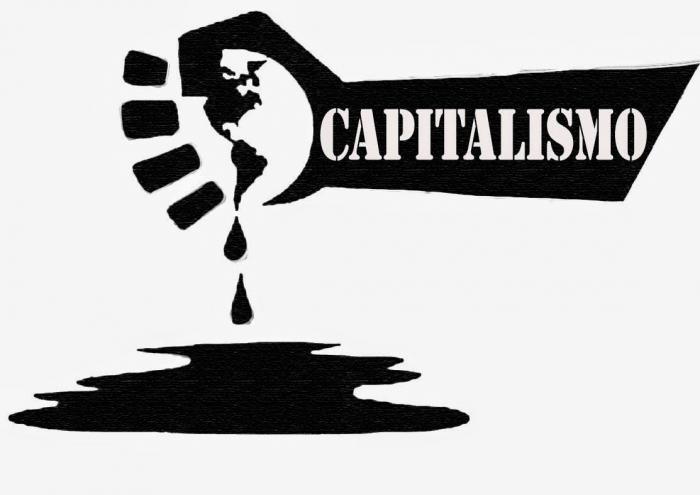
Churchill said that capitalism (he disguised it with the word democracy) was the worst form of government, except for all the others. Something that Eisenhower liked to repeat, who, as a military man, was not exactly known for his profound ideas. The sharp phrase might be clever if it were true, but it is not.
Today, the worst system is capitalism, above all others, of humanity and even of the planet.
This pandemic, unfortunately, only made the reality of it more visible to everyone. Capitalism is incapable of surpassing itself in terms of humanity, it only does so in terms of capital.
While people are dying in the streets, in the US, governors are cheating each other to ensure that the manufacturers of medical instruments sell them their products to the detriment of others. According to New York Governor Andrew Cuomo, ventilation equipment companies are calling government offices to say that their order has been overtaken by another state’s, which has just upgraded its purchase offer. Thus, based on the death of human beings, the companies are seeking to magnify their profits in the midst of tragedy.
The price of ventilation equipment has gone from $25,000 to $40,000, when it is needed most. The state, hospital or institution that does not have enough resources to buy them, simply will not have them, regardless of the cost in lives.
The nice motto that he says is that where some see problems, others see opportunities, is no longer so nice. Governor Cuomo is threatening to sign an order allowing the confiscation of unused medical equipment stored in private spaces for speculative purposes.
That is, people and businesses that keep unused ventilation equipment waiting for the advance of the pandemic to make it more expensive and then sell it to hospitals.
The federal state has been unable to impose a national policy for the distribution of medical equipment and supplies. If they ever do, because of their slowness, the dead will no longer be able to thank them. It is a matter of every person for themselves, typical of capitalism and today seen in all its criminal magnitude.
Practices of pillage that are nothing new, but that in everyday life are hidden behind the mantra that “that is the norm”. But that is not all. European governments confiscate shipments of medical equipment in transit to other European nations. France has confiscated 130,000 nasobucos in transit to the United Kingdom. Germany claims that the US Government has confiscated 200,000 masks that it had already bought from a manufacturer in China, owned by a US company. The shipment was intercepted in Bangkok at an event that German Interior Minister Andreas Geisel called modern piracy’.
Canadian Prime Minister Justin Trudeau complained that a shipment of masks had been reduced because part of it had been repurchased by the U.S. In Turkey, the nasobuco business has become so profitable that the government has confiscated nearly one million clandestine sales in a business that is already estimated to be worth over several million in profits.
The United States, not even for a moral imperative, would help the global fight against the pandemic. Reality shows its inability to do so effectively even in its own home, where Make America Great Again we already know what it [really] means, at the expense of the rest of humanity.
If anything, for the elites, America is 1% at the top of the social pyramid. Capitalism cannot fail to be savage; what happens is that, now, savagery without make-up touches the showcases, where their miseries were hidden behind the prosperity they maintain at the expense of the poorest people.
Frantz Fanon said that fascism was the name given to colonialism when it was brought to the metropolises. Outside of the first world centrality, the horror is lived in Ecuador or another location, which in that scavenging use of language, are usually called peripheral or emerging. Today, in front of the evidence of the medieval nightmare, they do not even mention it.
But it is worth remembering, now that everyone in the metropolises is scared, that the Third World does not escape pandemics. In Africa alone, 30 million people are in life-threatening conditions of hunger, and certainly with consequences for their physical and mental development.
Of the 5.9 million children who die every year in the world, at least half are the direct result of hunger. Oxfam, the author of the above-mentioned data, explains this reality very well: “Hunger is not the result of too many people and too little food. It has to do with power, and its roots lie in the prevailing inequality in access to resources and opportunities”.
Whoever believes that all other systems are worse, look at the blocked and vilified Island, where no one dies of hunger, everyone is guaranteed medical security and the human being is the center of the system.
The problem is capitalism.
Isolation, Quarantine and Social Distancing


Differences Between Isolation, Quarantine and Social Distancing
The World Health Organization has recommended these public health strategies to stop the new coronavirus, but how shall we differentiate between them and apply the appropriate one in each case?
April 6, 2020
Translated and edited by Walter Lippmann for CubaNews.
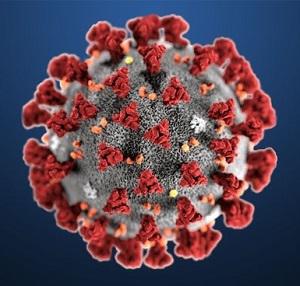
ISOLATION
Isolation applies to people who have tested positive for Covid-19, to suspected cases or to people who have had close contact with sick people and who would have a high probability of having contracted the virus.
Isolation should be strict to avoid contact between people who have become ill and those who are healthy and is usually done within a hospital or health center, with the necessary medical supervision.
QUARANTINE
It is the way to limit the movement of healthy people who may have been exposed to the virus and do not know it. Quarantine lasts 14 days and must be done by all people who arrived from the affected and high transmission areas of covid-19.
VOLUNTARY QUARANTINE
Many people have made the decision to stay home voluntarily, as a preventive measure for two weeks. This way they will avoid contact with other people. By not attending work, not receiving visitors at home, and not using public transportation, the risk of contagion is potentially reduced.
SOCIAL DISTANCING
If you are not in quarantine or isolation, when you leave your home for strictly necessary reasons, such as going to the supermarket or pharmacy, you should adopt social distancing: separating one meter from another person, minimizing activities or going to public places.
SOURCE: agendapro.com
70% Increase in Gender-Based Violence

Chile Reports 70% Increase in Gender-Based Violence During Quarantine
The Chilean Government is preparing a set of measures to expand the network of support for women victims of gender violence from government and business bodies
April 7, 2020
Translated and edited by Walter Lippmann for CubaNews.
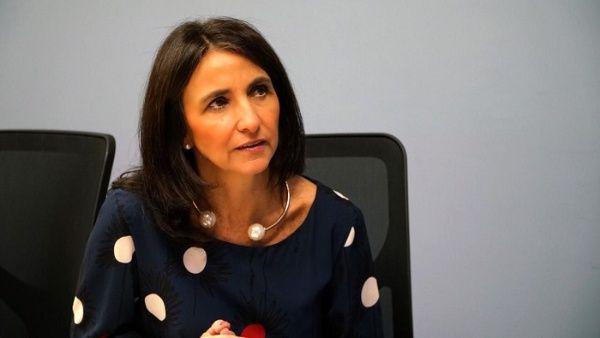
Minister Carolina Cuevas explained that Chilean women need to ask for guidance and help when they are victims of domestic violence. Photo: Taken from Telesur
The Ministry of Women and Gender Equality in Chile reported on Monday a 70 percent increase in calls made by women to a domestic violence hotline during the first weekend under quarantine in the country following the health crisis generated by the coronavirus.
The information came to light as part of a study provided by the minister of the portfolio, Carolina Cuevas, who implemented a contingency plan that included special reinforcement of the Fono Orientación 1455 shifts, to protect women who reported being subjected to domestic violence.
The weekend before the quarantine, 532 calls were received, while in the same period, one week later, the number rose to 907. “This significant increase in calls is also a reflection of the fact that there is a need to ask for guidance and help in times when women are spending more time in our homes, possibly with our partners,” Cuevas explained.
For its part, the Public Prosecutor’s Office reported that, although reports of domestic violence have decreased by 18 percent compared to last March, reports of femicide have increased by 200 percent in the same period of time.
The Chilean government is preparing other measures to expand the network of support for women victims of gender violence, such as coordination with public agencies to safeguard care in periods of emergency, increasing the capacity of shelters and a messaging service, via SMS or WhatsApp, so that women can communicate in a “silent” manner that will be implemented in the following weeks.
Cuevas also met with the president of the employers’ union, the Confederation of Production and Commerce (CPC), Juan Sutil, to discuss the impact of the health crisis on women workers. The minister requested that companies provide formal support to women in preventing domestic violence and incorporate the issue into their permanent policies.
In this regard, a group of Chilean women legislators and feminist organizations sent a letter to President Sebastián Piñera, asking him to strengthen measures to prevent violence, to prohibit the sale of alcohol that can trigger violent acts, such as creating immediate action groups and establishing strategies for reporting violence through websites, pharmacies or supermarkets. Gael Yeomans, MP and president of Convergencia Social, said that additional measures should be taken to allow victims of gender-based violence to break out of quarantine if they need help.
Global #QuedateEnCasa Campaign

How Did the Global #QuedateEnCasa Campaign Begin?
A Spanish-language label is spreading rapidly through Facebook and Twitter. Used in serious, funny publications, it is used by professionals to share tips on how to protect themselves from COVID-19 and the citizens of the world when they post photos from their days of isolation, at home, in physical isolation.
April 7, 2020
Translated and edited by Walter Lippmann for CubaNews.
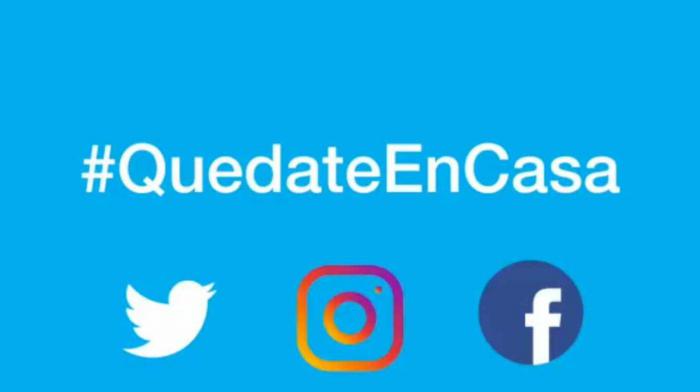
Photo: Taken from the Internet
This is the famous label #QuedateEnCasa, which – who would imagine it – began as a challenge from the doctors and nurses at the Hospital Clínico in Madrid. They invited all of Spain to become aware of the importance of individual responsibility to avoid infecting other people, according to the Mallorca newspaper.
The challenge, the first and most famous of many launched later by people from all over the world, began with a video available on the official Twitter account of the Public Health of the Community of Madrid that exceeded 250,000 views in five hours. In the audiovisual, the medical staff calls on the population to join a voluntary quarantine and recommends taking responsible measures so as not to collapse the Spanish health system.
According to Europa Press, the promoter of the initiative was surgeon general Sandra García Botella, who came up with the idea “because of the impotence of seeing that the message that is being transmitted through the media is not reaching the people well” (?) “it’s not a vacation, the children don’t have to be in the park, [the young people] don’t have to be staying, they don’t have to go out to the bars,” she said.
She also added that with the youth “it doesn’t work for a politician to go out and give a message, hashtags [labels] work, challenges work.
The campaign, which immediately went viral on social networks, was joined by representatives from the world of sports, entertainment, culture and “influencers. Now there are videos calling for social isolation, such as the one by the Spanish Football Federation. New challenges have appeared to encourage confinement, such as daring to tell a goal, creating recipes with a sporting aroma, doing crossfits with bags of rice, or playing golf with toilet paper, says Marca, one of the most well-known media in the field of sport.
In Italy, they launched a campaign similar to the Spanish #QuedateEnCasa. The authorities resorted to more shocking images to reach their population more effectively. Then the campaign calling for quarantine had to be turned into law to contain the pandemic.
Quarantine is the way to limit the movement of healthy people who may have been exposed to the virus and don’t know it, says the World Health Organization. It usually lasts 14 days and must be done by all people who arrived from affected areas with high transmission of the virus.
Social distancing, on the other hand, is the separation of one meter between one person and another; and is based on the call not to go to public places, as well as to avoid population concentrations.
In the face of the global emergency caused by the new coronavirus that appeared in China at the end of 2019, many have decided to stay home voluntarily as a preventive measure.
By not going to work, not receiving visitors and not using public transport, the risk of contagion is potentially reduced. This type of decision is called voluntary quarantine.
A World Without Movie Screens
A World Without Movie Screens
 by Julio Martinez Molina
by Julio Martinez Molina
Audiovisual critic and journalist, member of the Cuban Association of the Film Press and UNEAC. Author of the books published on film criticism in North America and the end of the century, Causes and Influences of Contemporary Cinema and Haikus of My Filmic Emotion. From his blog, La Viña de los Lumiere
March 16, 2020
Translated and edited by Walter Lippmann for CubaNews
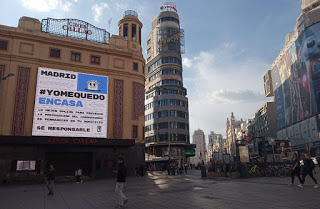 Whether or not it is a bacteriological weapon of the United States aimed at slowing down China’s advance, the coronavirus has seriously affected the world economy; especially that of Washington’s main rival, yes, but its overall effects reach a planetary scale, including the northern nation itself.
Whether or not it is a bacteriological weapon of the United States aimed at slowing down China’s advance, the coronavirus has seriously affected the world economy; especially that of Washington’s main rival, yes, but its overall effects reach a planetary scale, including the northern nation itself.
The saddest images of the harshest dystopias are now verified, not in book pages but in real scenarios characterized by desolation. What happened or is happening in nations such as China, Iran, Italy and Spain surpasses any science fiction or fantasy narrative.
A world on edge sees closed borders, has confined millions of citizens, separated regions and blocked the entry of tens of thousands of people.
This attack on humanity does not understand geography, economic classes, or climate. Nor of fields, sectors, industrial universes and the entertainment industry. The latter is experiencing a very strong contraction at a global level, except in streaming giants such as the American platform Netflix or in the pornography industry, an emporium that annually moves more money in the US than the NBA. The same coronavirus has even been a callous theme in several “adult films”.
Now, beyond such exceptions or others very pointed, the turn suffers the biggest cliff in its history. The plunge in ticket sales meant a 45 percent drop this weekend in the U.S. and Canada. In the main cities of both nations, theaters were closed during the night of Sunday the 15th. The start of the closures was marked by China on February 2, when the Alliance of Radio, Film and Television Production Committee and the Federation of Radio and Television Association directed film companies, production teams, actors and actresses to cease work.
Both there and in the US, India (the country that produces the most films per year in the world), France, Spain and Italy paralyzed film activity. The Los Angeles Times reports that “the Fast & Furious franchise has decided to postpone the release of its ninth film for a full year. Neither will the new James Bond film, No Time To Die, a decision made several weeks ago to postpone the release from April to October. For its part, the Disney giant’s coronavirus agenda could not have been worse: Its big bet for spring was the new version of Mulan, a film that, for obvious reasons, has the Asian market as its main focus.
“After postponing Mulan’s global release and closing its theme parks, Disney has taken another drastic decision to curb the coronavirus: to suspend production of all its films, with animation as an exception. This way, the new version with real actors of The Little Mermaid will delay its shooting, which was going to start soon in London, as well as William of the Bull’s thriller Nightmare Alley, Ridley Scott’s drama The Last Duel and the next installment of Home Alone. The new Peter Pan and Wendy, as well as Shrunk, a sequel to the 1980s classic Honey, I Shrunk the Kids, were also delayed, although both were in early pre-production.
“Disney’s decision affects a large number of studios the company owns, such as Fox and Searchlight. Marvel, also under its control, suspended the filming of Shang-Chi and The Legend of the Ten Rings, after its director, Destin Daniel Cretton, has been isolated by his own decision. The Mickey Mouse factory has also suspended some 16 television pilots for the same reasons. They have also interrupted filming in other different studios such as Mission: Impossible in Italy, Official Competition – with Penelope Cruz and Antonio Banderas – in Spain, and The Amazing Race” competition around the world. And preparations for filming the biography of Elvis Presley have been slowed down after one of his protagonists, Tom Hanks, tested positive for the coronavirus in Australia,” says the half-Angelian.
Shooting on Sony’s Budapest-based The Nightingale, starring sisters Elle and Dakota Fanning directed by France’s Melánie Laurent, also stopped. The Malaga (Spain) and Guadalajara (Mexico) film festivals were cancelled. And so, unstoppable is the rosary of news that arrives every morning.
It has been published that the losses may frustrate the five billion dollars, a peak that I consider extremely low given the circumstances.
Subscribe to Blog via Email
| M | T | W | T | F | S | S |
|---|---|---|---|---|---|---|
| 1 | ||||||
| 2 | 3 | 4 | 5 | 6 | 7 | 8 |
| 9 | 10 | 11 | 12 | 13 | 14 | 15 |
| 16 | 17 | 18 | 19 | 20 | 21 | 22 |
| 23 | 24 | 25 | 26 | 27 | 28 | |

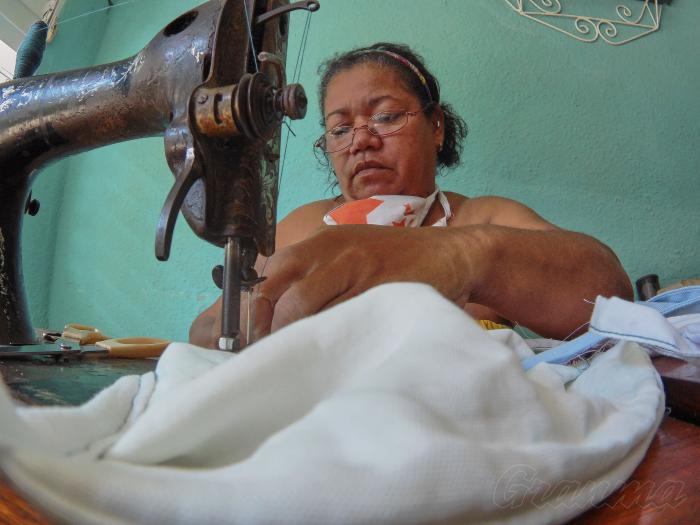
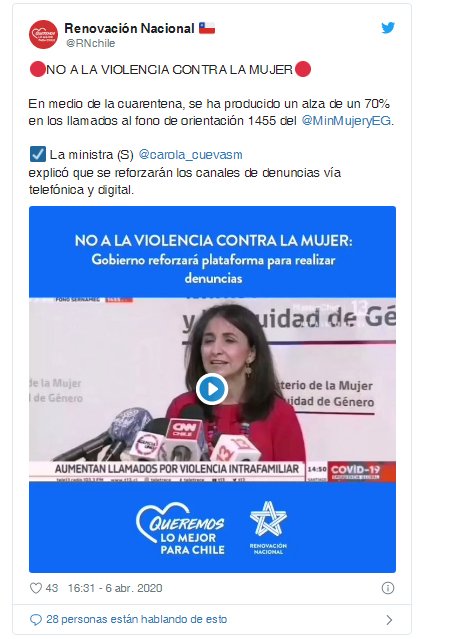
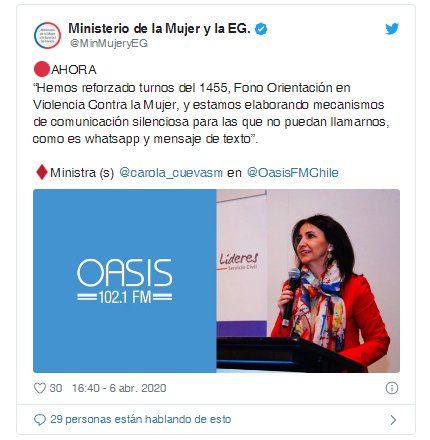
You must be logged in to post a comment.